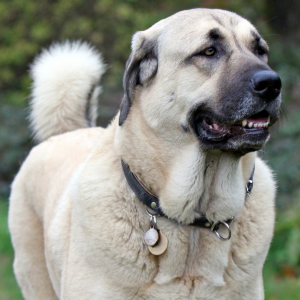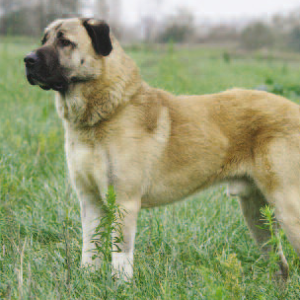
Anatolian Shepherd Dog
Anatolian Shepherd Dogs are serious, intelligent working dogs with protective instincts. Known for their speed and agility when in the field, and their loyal and loving nature with their owners, they are wonderful and hardworking companion pets.
Interested in discovering if your dog is an Anatolian Shepherd Dog?
Check out Wisdom Panel's DNA tests.

Anatolian Shepherd Dog Traits
General Appearance
These large and impressive dogs have a rugged appearance that’s indicative of their working background. They are muscular and heavy-boned, with a strong head and almond-shaped eyes that convey their intelligence.
Coat and Coloring
The Anatolian Shepherd Dog has two coat variations, one short and one long, the long of which is referred to as rough. Both types have longer, thicker hair at the neck and mane, respective to the overall coat length.
They may have some feathering around their ears, legs, and tail, and they come in any color pattern and marking.
Distinctive Physical Traits
The first thing most people notice about the Anatolian Shepherd Dog is their large, powerful appearance. They are a broad breed, with a well-muscled torso and strong head.
Anatolian Shepherd Dog Temperament
The Anatolian Shepherd Dog is known to be loyal and calm, loving and devoted to their people, but they are very territorial, and they can be reserved and wary of strangers.
This breed only requires a moderate amount of exercise—so they’re well-suited to play in the yard or take long walks—but they have a strong urge to protect, so they should be kept on a leash or in a secured area at all times when they are outside.


Anatolian Shepherd Dog History
While the breed’s ancestry dates back to the Babylonian Empire, today’s Anatolian Shepherd has its beginnings in Anatolia, a peninsula that includes the Asian portion of Turkey. There, in the harsh and unforgiving landscape, goat and sheep herders developed the breed as a guardian for their livestock, calling it the ‘Coban Kopegi,’ or the shepherd’s dog.
Before World War II, the United States Department of Agriculture imported a pair of Anatolian Shepherd Dogs from Turkey as part of a program to determine breeds best suited for work on sheep pastures. The onset of the war shifted focus from the so-called “Sheepdog Project,” and the Anatolian Shepherds found homes across the U.S.
The breed found its stride in the 1970s when Lieutenant Robert Ballard brought a pair of Anatolian Shepherds back to the U.S. from Turkey and began breeding them.
The institution of the Endangered Species Act in 1973 provided the Anatolian Shepherd with plenty of herding work; these formidable dogs used intimidation to scare off predators like wolves from the livestock they handled, rather than killing them.
The breed still works on many farms today in the U.S. and Turkey.
Anatolian Shepherd Dog Care
Nutrition
As with most active breeds, the Anatolian Shepherd Dog does best with high-quality dog food that’s suited to their particular life stage.
It’s important to monitor the amount of food and treats that you give your Anatolian Shepherd Dog, especially since some dogs may be prone to gaining weight as they age.
In general, though, this breed isn’t traditionally known to overeat. Your veterinarian is always a good source to help provide you with appropriate nutrition and feeding guidelines.
Grooming
The Anatolian Shepherd is a working dog, which means they have a working dog’s coat. Their fur includes a thick, protective undercoat, as well as an outer coat that requires brushing once a week to stay healthy.
You can also expect your Anatolian Shepherd Dog to shed twice a year, during which time they will need more frequent brushing to remove loose and dead hair. Brushing their hair every few days during this time should help.
All dogs require regular dental care, including at-home teeth brushing and professional dental cleanings, and the Anatolian Shepherd Dog is no exception. Maintaining good dental hygiene is important for their overall long-term health.
Exercise
Although they are a working breed, the Anatolian Shepherd Dog requires only moderate exercise, especially compared to other shepherd breeds.
A long walk or round of play in a fenced backyard is great for the breed. But, when outside, remember to always keep your Anatolian Shepherd on a leash or in a fenced area.
Training
Although loyal and loving with their people, the Anatolian Shepherd Dog can be wary towards others.
Because they have a history of being independent workers, they may be difficult to train. Early and proper socialization is key.

Breed Group
Middle Eastern and African
While this ancient group shares many of the characteristics of the Hound Group, their origins, as the name would suggest, are concentrated in Africa and the Middle East unlike the hound group that has no true geographic center.
Resources
http://asdca.org/anatolianshepherd.html
https://www.akc.org/dog-breeds/anatolian-shepherd-dog/
http://images.akc.org/pdf/breeds/standards/AnatolianShepherdDog.pdf
Reviewed July 26, 2020 by Cindy Elston, DVM, MPH




















